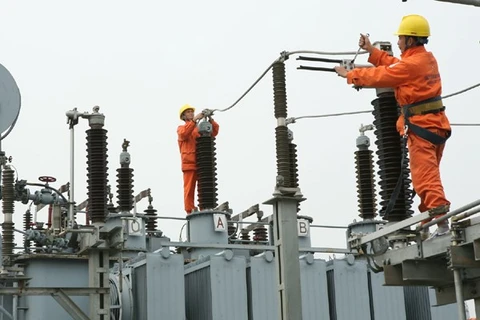The new retail electric tariff will be submitted to the Government for consideration in October, said Dinh The Phuc, deputy head of the Electricity Regulatory Authority of Vietnam (ERAV).
Phuc told the press in early September that the Ministry of Industry and Trade required the ERAV calculating to reduce current power tariff levels from six to three or fewer. The ministry has also asked the Electricity of Vietnam Group to recalculate the levels.
He added that EVN was instructed to organise conferences in the north, central and south regions to gather ideas from scientists, businesses and the public regarding the power tariff levels.
He noted that the devaluation of the Chinese yuan and the State Bank of Vietnam's decision to increase the exchange rate by 1 percent have had effects on businesses borrowing foreign currencies for their investments, as well as on those purchasing materials.
The EVN poured 72.8 trillion VND (3.23 billion USD) into its power projects, with disbursement of 55.1 trillion VND (2.45 billion USD) in the first eight months of the year.
Reports from EVN showed that these included such key national projects as Trung Son, Song Bung 2, expansion of Thac Mo hydropower plants, Duyen Hai 3, Vinh Tan 4 and Thai Binh Thermopower plants.
The group completed connection of 10 power grids in August, bringing the total grids in eight months to 121. In addition, it started construction on three new power grids of 500-220kV in August.
The country's power output in August reached 14.8 billion kWh, equivalent to the previous month. In the January-August period, the total power output was 108.2 billion kWh, posting a 13 percent year-on-year increase.
The locally produced power for the period rose by 12 percent from last year to 105.15 billion kWh. The hydropower source accounted for 35 percent, thermo power accounted for 34 percent, with the remaining coming from gas turbine and imported power.
The country was estimated to save 2,095 billion kWh in eight months, accounting for 2.23 percent of the nation's electricity output.
Power generation companies, such as the Vietnam National Coal-Mineral Industries Holding (Vinacomin) and EVN, were also told to calculate the effects from exchange rate differences and reported to the ministry.
"ERAV reviews the effects on retail prices and discusses them with the Ministry of Finance (MoF) to decide whether to add Vinacomin's losses to the electricity tariff," Phuc added.
Further, Deputy Minister of Industry and Trade Do Thang Hai said any adjustment relating to power tariffs will be carefully reviewed, in cooperation with relevant agencies such as the MoF and the Ministry of Planning and Investment and submitted to the Prime Minister for consideration.
At a recent meeting of the ministry, representatives from EVN, Vinacomin and the Vietnam Oil and Gas Group (PetroVietnam) said foreign exchange differences have had great impacts on their production and trade activities.
The three large conglomerates reported losses of trillions of dong as a result of foreign exchange differences.
Deputy Director General of Vinacomin Vu Anh Tuan said the group has incurred losses of around 1.2 trillion VND (53.3 million USD) as a result of exchange differences.
Deputy Director General of PetroVietnam Ninh Van Quynh said foreign exchange differences, coupled with oil price reductions, led to a sharp decrease in the group's revenues.
The group has borrowed a large amount of foreign currency to carry out large projects, so the adjustment of the exchange rate has a great impact on its production and business, he said.
PetroVietnam's total revenue in the past eight months of the year stood at 383 trillion VND (17.01 billion USD), equivalent to 53 percent of its set target, he said.
Meanwhile, Deputy Director General of EVN Ngo Son Hai said the group suffers losses some ten times higher than those of Vinacomin, but failed to report the exact amount of losses.
He said EVN will calculate the exact amount of losses to report to the ministry.
He proposed the Government have measures to support businesses, such as tax reductions and relaxations, as well as policies to help businesses tackle these difficulties.-VNA
























